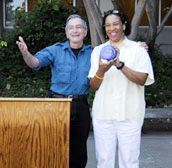Pam Sturner, the Executive Director of the Leopold Leadership Program at the Stanford Woods Institute for the Environment, recently wrote to inform us that alumna “Dr. Dawn Wright has been selected as one of twenty Leopold Leadership Fellows for 2011. The Leopold Leadership Program is a competitive fellowship for outstanding academic environmental scientists who are also actively engaged in outreach to decision-makers and the public about their work. The program was created in 1998 by Dr. Jane Lubchenco in recognition of the fact that, with the elevation of environmental issues in the public sphere, environmental scientists are increasingly called on to contribute their knowledge to decision-making. The fellows receive two weeks of intensive training and networking to help them enhance their capacity as leaders and communicators about their work with audiences outside academe.”
Distinguished alumna Dawn Wright received Interdisciplinary PhDs in Physical Geography and Marine Geology in 1994. An Oregon State University faculty member since 1995, Wright is a marine and coastal geography expert so passionate about her subject that she’s known as “Deepsea Dawn.” She was elected a Fellow of the AAAS in 2009, is featured on a web site about “Women Exploring the Oceans,” and was profiled in the book “What Do You Want To Be? Explore Earth Sciences.” In 2007 alone, she was elected a U.S. Professor of the Year by The Council for Advancement and Support of Education and the Carnegie Foundation for the Advancement of Teaching; she was chosen as the Commencement Speaker for the UCSB Division of Science and Mathematics; she won UCSB Geography’s Raymond C. Smith Distinguished Alumni Award; and she was a finalist for the Loyd Carter Award for Outstanding and Inspirational Undergraduate Teaching, College of Science, OSU. For more about our illustrious alumna, see her web site here.
According to Sturner’s press release, Dawn will join a network of 153 past fellows who are actively working to infuse the best research into public and private sector discussions about the environment. The fellows were chosen for their outstanding qualifications as researchers, demonstrated leadership ability and strong interest in communicating beyond traditional academic audiences. Each fellow participates in two weeklong training sessions where fellows take part in mock media interviews and meet with policymakers in Washington, D.C. The fellowship also offers peer networking and mentoring through the Leopold Leadership Network of program advisors, trainers and past fellows. “Academic scientists work hard to understand environmental problems and develop potential solutions, but to actually solve problems requires communication and a two-way flow of information between scientists and decision makers,” said scientific director Pamela Matson, dean of Stanford’s School of Earth Sciences and senior fellow at the Woods Institute for the Environment. “The Leopold Leadership Program trains academics to close the gap between knowledge and action.”




